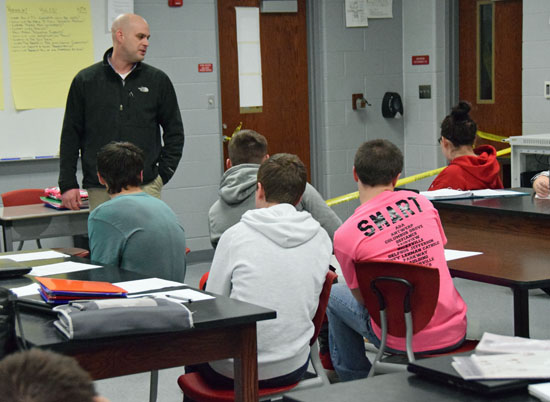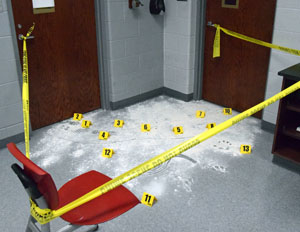VWHS students learn through CSI project
DAVE MOSIER/independent editor
While not all students will become crime scene investigators, students in Van Wert High School’s ICAP (Integrated Concepts of Algebra and Physical science) project-based learning class are getting a chance to discover some real-world applications for the information they learn in the classroom.

ICAP students were presented Monday with a crime-scene scenario that included a possible break-in at the school and the theft of chemicals from their classroom. An area of the classroom was roped off using yellow crime scene tape and numbered markers identified several items of potential evidence. Those included a variety of chemicals, as well as a footprint and handprint.
An official-looking Van Wert Police Department memo providing details of the alleged break-in was given to students, while VWPD Detective Joe Motycka spoke to students about the “crime.”
A synopsis of what was being asked of students was also included in the memo: “As ICAP students, your responsibility will be to take the information and clues provided, including crime scene found today, and begin to scientifically and algebraically create a profile of the potential suspect(s) and his/her reasoning for the break-in.”
The project, first created three years ago when the ICAP class was developed as part of the school’s New Tech project-based learning curriculum, has been refined each year to include more processes and concepts learned in the classroom.
ICAP teacher Keith Recker said the project has been a popular one for students.
“This is usually one of their favorites,” Recker said, noting that the project provides an interesting way for students to apply what they’re learning in class.
As part of the project, ICAP students first took smartphone photos of the crime scene to ensure they had an image of the scene to go by — something that prove to be crucial as the investigation unfolds. In addition to using a number of mathematical and scientific principles during the project, students will also hone their people skills by interviewing potential “suspects” in the case (each will receive a list of people who were in the building at the time of the “theft”).
Students will test the chemicals during the project to identify them, and later establish the chemicals’ “street value”, while also using Algebraic equations to solve other facets of the case.
The students will also have to turn in written reports as part of the project and also make a group presentation at its conclusion.

“Writing a report also brings in English as well,” said Recker.
As with most PBL projects, ICAP students will get individual grades, as well as a group grade for the work they do on the project.
Unlike traditional education, where information is presented, memorized and tested, project-based learning develops a variety of skills in students, including how to communicate, make presentations and work with others in a group setting. It also develops critical thinking skills, since students, working mostly in a group setting, must identify what needs to be done for a particular project, as well as develop a plan to complete it.
The classes also challenge students by making them more accountable for their own education.
Jeremy Kitson, the other ICAP teacher, noted that students not only learn information, but are often challenged to defend what they have learned, citing a recent debate on nuclear energy conducted in the classroom that forced students to not only present information related to both sides of the subject, but to be able to refute arguments raised against their position.
Recker said teachers try to make projects fun, but also challenging.
“It’s enjoyable, but there is also a lot to learn,” he said, adding that the projects provide more repetition of the information being taught, which also helps students better retain the information.
POSTED: 03/04/15 at 8:31 am. FILED UNDER: News







